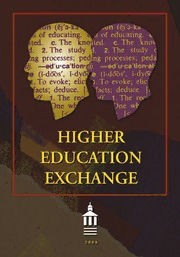
ERIC ED510312: Higher Education Exchange, 2008 PDF
Preview ERIC ED510312: Higher Education Exchange, 2008
HHIIGGHHEERR EEDDUUCCAATTIIOONN EEXXCCHHAANNGGEE 2 0 0 8 HIGHER EDUCATION EXCHANGE 2 0 0 8 Editors DavidW.Brown DeborahWitte AssistanttotheEditors SarahDahm CopyEditor JoeyEastonO’Donnell ArtDirector/Production Long’sGraphicDesign,Inc. CoverDesign,IllustrationsandFormatting Long’sGraphicDesign,Inc. TheKetteringFoundationisanonprofitoperatingfoundation,chartered in1927,thatdoesnotmakegrantsbutwelcomespartnershipswithother institutions(orgroupsofinstitutions)andindividualswhoareactively workingonproblemsofcommunities,governing,politics,andeducation. TheinterpretationsandconclusionscontainedintheHigherEducation Exchange,unlessexpresslystatedtothecontrary,representtheviewsofthe authororauthorsandnotnecessarilythoseofthefoundation,itstrustees, orofficers. Copyright©2008bytheKetteringFoundation TheHigherEducationExchangeisfoundedonathoughtarticulatedby ThomasJeffersonin1820: Iknownosafedepositoryoftheultimatepowersofthesocietybut thepeoplethemselves;andifwethinkthemnotenlightenedenough toexercisetheircontrolwithawholesomediscretion,theremedyis nottotakeitfromthem,buttoinformtheirdiscretionbyeducation. InthetraditionofJefferson,theHigherEducationExchangeagreesthatacentral goalofhighereducationistohelpmakedemocracypossiblebypreparing citizensforpubliclife.TheHigherEducationExchangeispartofamovementto strengthenhighereducation’sdemocraticmissionandfosteramoredemocratic culturethroughoutAmericansociety.Workinginthistradition,theHigher EducationExchangepublishescasestudies,analyses,news,andideasaboutefforts withinhighereducationtodevelopmoredemocraticsocieties. CONTENTS DeborahWitte Foreword 1 DavidW.Brown TheJourneyofa“RecoveringProfessional” 5 SeanCreighton TheScholarshipofCommunity 12 PartnerVoice MargueriteS.Shaffer ChangingPublicCulture: 23 andLourdesLeon AnInterview LauraH.Downey, PartnershipsforSupportingLocalHealth 39 CarolL.Ireson, Efforts:TheLinkBetweenRuralJournalism F.DouglasScutchfield, andPublicHealthinOneRuralCommunity andAlCross IraHarkavy DemocraticPartnerships:AnInterview 47 EdithManosevitch Democracy’sGoodName:TheRiseand 59 RisksoftheWorld’sMostPopularForm ofGovernment ByMichaelMandelbaum DavidMathews Afterword 64 FOREWORD By Deborah Witte Whichwaydoyousayit?University-communitypartnerships?Or community-universitypartnerships?Doesitreallymatter,orisit justsemantics?Ineverusedtothinkitmattereduntilacolleagueof minebegantobringtogethergroupsofeverydaycitizenswithsome universityfaculty.Herworkbeganasaresearchexperimenttolearn fromtherelationshipsthatafewcommunitiesanduniversitieswere forging.Theresearchprojectwasknownsimplyastheuniversity- communityworkshop.Butthensheturnedthenameonitshead,and put community first. What a difference it made.Thinking about thesepartnershipsasoneinwhichthecommunityleadstheway leftmefeelingalittleoffbalance.Iwassousedtotheotherdynam- ic.Soisitjustsemantics?Idon’tthinkso. Thisjournal,throughoutitsdecade-plushistory,hasstrivedto beaplacewherefaculty,administrators,students,andcitizensmight exchangeideas,news,andpracticesinanefforttohelpdemocracy workasitshould.Wethinkofourselvesaspartofamovementto strengthenhighereducation’sdemocraticmissionandfosteramore democraticculture.Whilewe’vehadsuccess engagingfaculty,and tosomeextentstudentsandadministrators,we’vebeenlesssuccess- fulwitheverydaycitizens. For some time now, Kettering’s research has attempted to raisethevisibilityofthepublic’sattitudethathighereducationand other “public” institutions only represent and grant legitimacy to theestablishedelite.Institutionstraditionallyfosteranethosofpro- fessionalismthatelevatestheroleofexpertsoverthatofeveryday citizens.Theacademyneedstoaskitself,issimplywishingtoserve citizensenough?Whydosofewcommunitiesengagewithuniversi- ties around anything but technical or expert knowledge? Higher education,workingonbehalfofthepublic,canbesomewhatarro- gantandasaresult,citizensresistengaging.Instead,theywantto workwithinstitutions. WhileKetteringhaslongbeeninterestedinthecommunity- universityconnection—thisjournalisatestamenttothatideaaswell 1 asothers—wehaven’tdoneagoodjobengagingthecitizen.Andit’s timetodothat. TheissuebeginswithanessaybyDavidBrown,coeditorof theHigherEducationExchange.Davidfocusesontheproblemof theprofessionalmindsetinhighereducationthathasincreasingly fosteredacultureofcredentialed“problem-solvers.”Butwhathap- pens, he asks, when the problem-solvers come up with solutions that don’t have a connection to the way the community thinks aboutanddefinestheproblem?Thegapbetweenuniversityand communityjustgetswider.Beingaprofessionalshouldmeanbeing sensitivetocitizensandtheirconcerns.Instead,asBrowntellsus, manyprofessionals“distancethemselvesfromthosewhoseinterests they serve.” But his experience has taught him that the “most importantassetthatprofessionalsbringtoproblem-solvingistheir ‘tacitknowledge’acquiredinpractice—experiencethatgoeswell beyondtheformalknowledgeacquiredintheirschooling.Itfollows, then,thatthe‘localknowledge,’thepracticalexperiencethatthose withoutcredentialsbringtoaproblem,alsocountsandshouldbe anecessarypartoftheirproblemsolvingtogether.” Inthenextessay,SeanCreighton,anewlymintedPhDfrom AntiochUniversity,shareshisdissertationexperience.Longinterested incivicengagementeffortswithinhighereducation,Creightonwas quicktorealizethatalmostalloftheresearchoncommunity- universitypartnershipswasfocusedontheuniversity.Noonewas studyingthephenomenonofengagementfromthecommunity’s perspective.Andsohesetouttodojustthat.Usinganaction-research methodology,Creightongatheredagroupofrepresentativesfrom communityorganizationswho,overaperiodofseveralmeetings, cameupwithtenindicatorsofcommunityengagement.Whilethe indicators themselves are revealing, even more interesting was the reactionCreightonreceivedwhenhepresentedhisresearchatacad- emicconferences.Thevalidityofhisresultswasquestioned,his methodologywasquestioned,thesamplesizeandeventheoverall researchdesignwasquestioned.Despitetheskepticismofsome academicstowardhisresearch,Creightonremainscommittedto hismostimportantfinding,thevalueoflisteningcloselytocom- munitypartners. AninterviewwithMargueriteShaffer,anassociateprofessorat MiamiUniversity,follows.Shaffersharestheinsightsshediscovered while developing a new American studies major that provides opportunitiesforstudentstoengageinthecommunity.Shefound 2 thatstudents,aswellasfaculty,embracedtheopportunityto“put theirlearningtoworkinalargerpubliccontext.”Onesuchproject, ActingLocally,“explorestheintersectionsbetweenglobalization andlocaltransformation”throughwhatShaffercallsthepartnership mechanism.Thispartnershipmechanismsupportsandsustainsindi- viduals,organizations,andcommunitiesbyfacilitatingconversations andmakingconnections.AnaccompanyinginterviewtotheShaffer pieceillustratesoneoftheseActingLocallyprojects.LourdesLeon, owneroftheTaqueriaMercadoBakery,tellsthestoryofalanguage exchangeprogramsheinitiatedthatbringstogetheruniversitystudents whowanttolearnSpanishandHispanicbakeryemployeeswhowant to improve their English. She says the project works “because we respecteachother,arealwaysopentocriticismandtryingnewthings, andweenjoywhatwearedoingtogether.” The following essay by Laura Downey, Carol Ireson, Doug Scutchfield, and Al Cross tells of their experiences linking a local newspapertoapublichealthinitiative,andtheimplicationsofthis partnershipforoneruralcommunity.Theprojectpushedtwouni- versitydepartmentstopartnerforonegoal:citizens’engagementwith andknowledgeofthecommunity’shealth.Butifthepartnershiphad juststoppedthere,wewouldbereadingaboutatypicalcommunity- universitypartnership.Instead,thisprojectalsoengagedthelocal newspaper to disseminate a series of articles titled, “Listening to Concerns and Discovering SolutionsTogether.” As Downey, et al. explain,“theassetsoftheacademicinstitutions…cansupportlocal institutionsifandwhentheirresourcesarelimited.”Therelationship betweentheuniversityandthelocalnewspaperbecamereciprocal; thepaperpossessedconnectionstothecommunitythattheuniver- sitydidn’thave,andtheuniversityprovidedtimeandtalentthatthe paperdidn’thave.Theyassertthatapartnershipwithintwodisciplines insidetheuniversitycouldnotensurethesuccessofthepublichealth initiative;thepartnershiphadtoextendintothecommunity. Anotherinterview,thisonewiththeUniversityofPennsylvania’s IraHarkavy,roundsoutthearticlesonpartnerships.Workingformore than twenty years through the Netter Center for Community Partnerships,Harkavyandhiscolleagueshaveworkedtoencourage collaborationsbetweenuniversitiesandcommunities.Theydothis through“aproblem-solvingformofservicelearning.Pennstudents, facultymembers,communityresidents,andevenK-12studentswork togethertohelpsolveuniversalproblems…astheypresentthem- selves locally.” Harkavy’s work, along with that of his colleagues, 3 is designed to lessen the gap between the community of West Philadelphiaandtheuniversity.Harkavyacknowledgesthisisn’tan easytask,especiallygiventhestilldominantdisciplinaryandmarket orientationsofhighereducation.Becominga“permanentanchor forrevitalizingschoolsandcommunities”isoneaimamongmany fortheserviceworktheuniversityundertakes.Anotherisadvancing theself-interestofsomeofhiscolleagues.Harkavysuggeststhat theirworkwiththecommunityenablesthemtorealize“civicgoals …thatmotivatedthemtobecomeacademicsinthefirstplace.” EdithManosevitchreviewsDemocracy’sGoodNamebyMichael MandelbaumfortheExchange.Mandelbaum’shistoricalanalysis oftheevolutionofdemocracy,Manosevitchexplains,provides empiricalevidencethatdemocracyhasalwaysbeenaccompanied bysomeformofmarketeconomy.Itisthemarketeconomythat servesasa“schoolfordemocracy”by“embeddingthevalues,habits, and attitudes … that underlie a well-functioning democracy.” Another factor at play, Mandelbaum suggests, is civil society. It “helps to further protect both popular sovereignty and liberty.” Whilethepromotionofdemocracyhaslongbeenthepracticeof theUnitedStates’foreignpolicy,itsprospectforgenuineadoption, hesuggests,“dependsonthedurabilityofexistingdemocracies.” DavidMathews,inhis“Afterword,”asks,“Whatareinstitutions ofhighereducationdoingabout‘thepublicanditsproblems’?” Hegoesontohypothesizethattherearetwoconceptsof“citizens” atplayintoday’spoliticalclimate.Oneconceptionofcitizenisas consumerorclient—ill-informedandeasilyswayed,an“impotent amateurinaworldwhereexpertprofessionalsnecessarilyrule.” Theotherconceptionis“citizenasproducerofpublicwork,”or “solverofwickedproblemsincommunity.”Highereducation,he asserts,willhaveasayinwhicheverconceptionwinsoutovertime. This 2008 issue of the Higher Education Exchange is our nascentattempttoengagewitheverydaycitizensandhigheredu- cationprofessionalswitha“citizen-centered”focus.Weprobably don’thaveitexactlyrightthistime,butthinkofitasafirststep. Letusknowaboutthecommunity-universityorcitizen-centered workyou’reengagingin.Andhelpushearthevoicesofthecitizens inoursharedendeavors. 4
